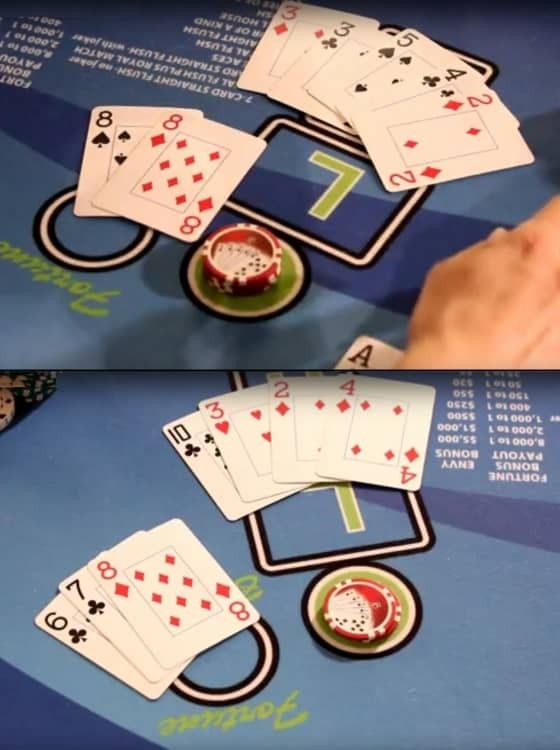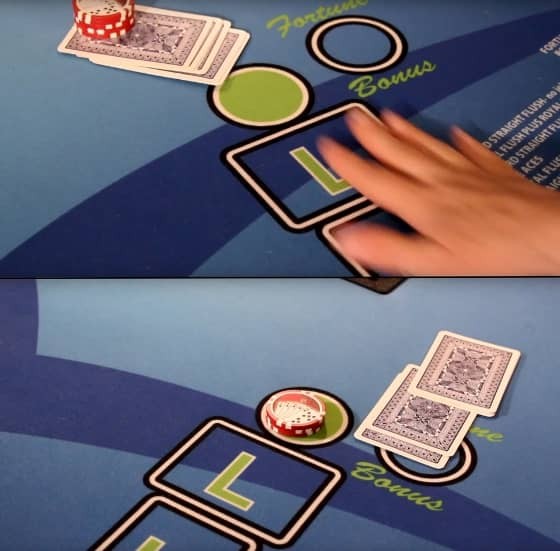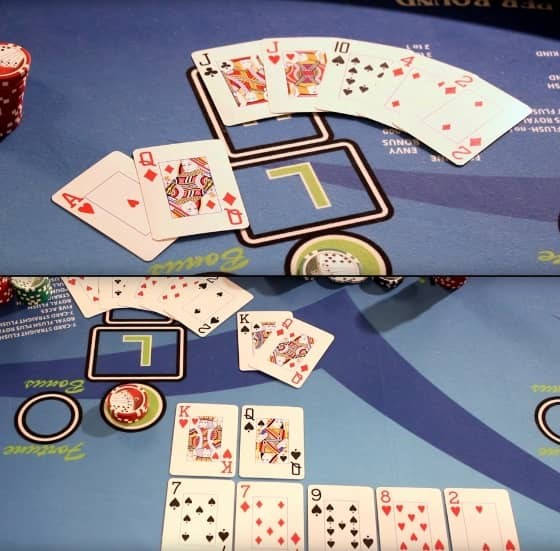Foul, Folding, Setting the Dealer’s Hand & Determining a Winner
How to Play Pai Gow Poker: Part 2
Table of Contents
How to Play Pai Gow PokerFurther Reading
- Part 1: The Basics & Setting the Player’s Hand
- Part 2: Foul, Folding, Setting the Dealer’s Hand & Determining a Winner
- Part 3: Poker Hand Rankings
- Part 4: Commission & Playing as Banker
- Part 5: The Dragon Hand, Fortune Bonus & Envy Bonus
- Part 6: The House Way
- Part 7: How to Play at Home
Did this free course help you?
Click to leave a tip to help keep this resource free!
Foul

The poker hand rankings for this game are the same as a normal poker game. When the player decides which hands to play where, they must remember that the poker ranking for the High Hand must be higher than the poker ranking for the Low Hand in order to qualify.
If it doesn’t, and the Low Hand is higher than the High Hand, then that hand is fouled and the wager is automatically lost. A foul will occur if the player sets their hand incorrectly; this will always result in a lost wager.
For example, if the player places 3 cards in the Low Hand and 4 cards in the High Hand, then the hand is fouled and the bet is lost. Thanks to corporate reasoning and the house edge, this rule does not apply to the banker or the dealer. If the banker or dealer fouls a hand, the hand will be reset in the correct way and the game will continue as normal.
Folding the Hand

One of the rules that carried over from poker is that the player has the option to fold their hand. If the player wishes to surrender their hand, they will either push their cards under the bet and towards the dealer or they will throw their cards towards the dealer.
The Player's Hand
Each player is responsible for setting their hand and no one, except the dealer, is allowed to touch their cards. If the player is unsure about how to set their hand, they can ask for assistance from the dealer.
Once the player is satisfied with their choice of hands, they will lay the cards face down in their designated areas. Then the dealer will flip over & expose their cards. Once the cards are exposed, the players are no longer allowed to touch their cards.
Setting Up the Dealer's Hand

The first thing that the dealer will do when they turn over their cards is rank their hand. This means that they will take the cards and set them up from highest to lowest from left to right. This is a good procedure to follow because it makes it less likely to miss any poker rankings.
The dealer has no choice of how the hand is set because the casino requires that it’s set the house way. The term “House Way” means it’s a pre-determined setting of the dealer’s hands depending on which cards they have received. Remember that the house way can and does vary from casino to casino.
Determining a Winner

Once the dealer has finished setting their cards, they will now compare their hand with the player’s hand to determine who the winner is. This is done by seeing which one holds the higher ranking.
When comparing the dealer’s High Hand with the player’s High Hand, whoever has the highest ranking wins the hand. The same is done for the Low Hand. If the player’s cards outrank the dealer’s on both the High Hand and the Low Hand, then the player wins the wager and the bet is paid even money minus a 5% commission. If the player wins a hand and loses a hand then the wager is pushed and no money is exchanged. One of the main attractions of Pai-Gow Poker is that there are a lot of pushes. So the player’s money can last a lot longer than if they were playing a game like blackjack. If the player loses both the High Hand and the Low Hand then they lose their wager.
There will be times when the player and the dealer will have exactly the same hand, and when all of the cards match this is known as a “Copy Hand” and the Banker will always win if there is a “Copy Hand”.
